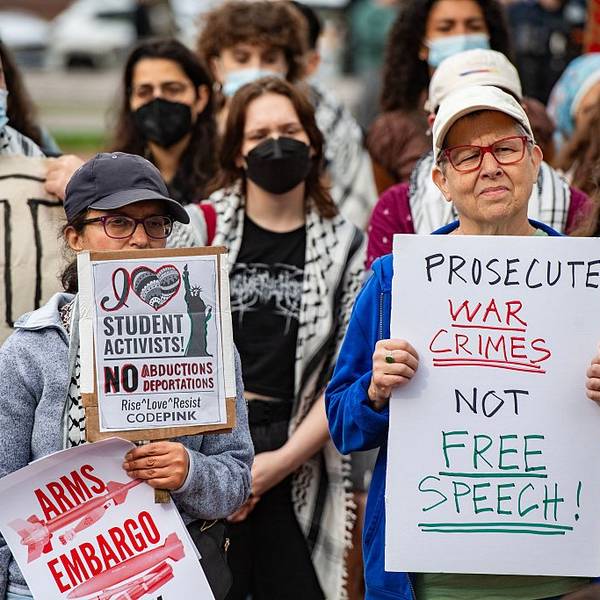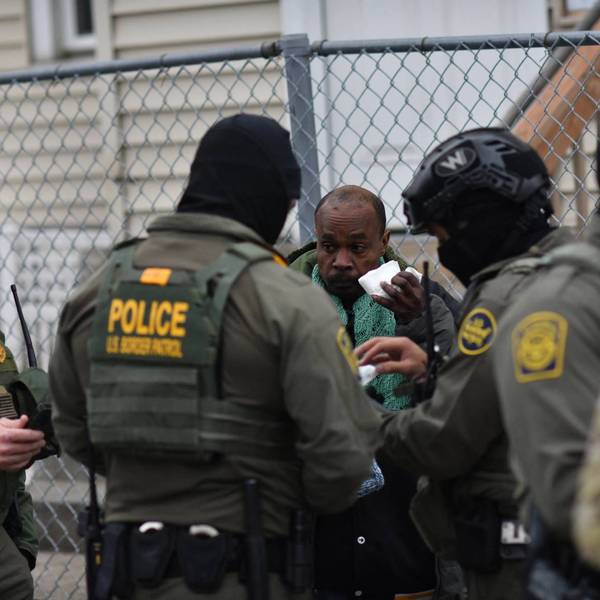Like many events that end up with a person in handcuffs, my story begins in a bar. I was in Atlanta earlier this month for Netroots Nation, the annual meeting of progressive organizers and writers, when I overheard friends discussing how to resist President Trump's first visit to Trump Tower. I jumped into the conversation: "Well, you call me, of course." Twenty minutes later, we had a rough plan that we would unfurl a banner inside Trump Tower the following week. I have been to many protests since the inauguration, and I was proud to do my part.
Together with Ultraviolet and the Working Families Party, we commissioned a painted banner that simply read "Women Resist White Supremacy." Through sheer luck, not only would Trump be in Trump Tower during my act of resistance, but he would be giving a news conference about 3:30 p.m. I knew from my previous work as a campaign advancer that the Secret Service would begin sweeps to clear the space about an hour before he spoke, so the best possible time for the action was 2 p.m.
Unlike previous presidents, Trump's home is in a public space. You don't have to sneak into Trump Tower. You enter via an atrium next to a Nike store. Then you pass through airport-style security run by the Secret Service. I wore my banner as a slip of sorts under my flowy dress. It was made of fabric, so it didn't set off the metal detector.
Like every good political operative -- I worked for Sen. Bernie Sanders's (I-Vt.) 2016 campaign and then the MoveOn super PAC supporting Hillary Clinton's campaign -- I run on coffee. Conveniently, the Starbucks inside Trump Tower is located on the second floor and overlooks an atrium -- exactly where I'd want to hang the banner. I sipped a flat white and waited for the right moment, when uniformed NYPD wouldn't be nearby. Then I unfurled the banner. A security officer grabbed it almost immediately. I ended up on the ground.
Since Starbucks is a public place and I was a paying guest, I knew I hadn't violated any laws. At worst, I could be banned from the building. I expected from past protest actions that I'd be given a warning and a request to leave. I clearly and politely explained to the NYPD officers who detained me that the protest was done and I was heading out.
They had other ideas.
A detective grabbed my wrist and cuffed me. A gaggle of officers from multiple law enforcement agencies escorted me to a room near the atrium. A few chairs had Trump campaign materials plastered on them. Inside the room with me were more than 10 officers from the NYPD and the Secret Service.
Then the questions began, and they were bananas. A young woman from the Secret Service began the questioning; male NYPD officers tagged in and out. They never asked me whether I understood my rights, and I wasn't actually sure at that moment what rights, if any, I had. I was focused on not getting put in a car and being whisked away.
It was clear right away that these officials wouldn't see me the way I see myself: as a reasonably responsible, skilled nonviolent political operative who works on a mix of electoral and issues campaigns. To them, I was clearly a threat to national security. It felt like an interrogation on "Homeland." Here are my favorite parts of the conversation, as I remember them.
NYPD: "Why would you come to the president's home to do this?"
Me: "It was wrong for the president to support white supremacy."
NYPD: "Don't you respect the president?"
Me: "I don't respect people who align with Nazis."
Secret Service: "Do you have negative feelings toward the president?"
Me: "Yes."
Secret Service: "Can you elaborate?"
Me: "He should be impeached and should not be president."
They were concerned with who bought my train ticket, once they saw the receipt on my phone. The NYPD officers didn't seem to believe me that some organizations work for justice and organize these legal protests.
Each time they touched my phone, I said I don't consent to the search of my phone. (They held my phone during the interview, and I can only hope they didn't poke around it -- alhough they wouldn't have found much to interest them, unless they like Bernie GIFs.)
Secret Service: "Have you ever been inside the White House?
Me: "Yes."
Secret Service: "How many times?"
Me: "Many. I was a volunteer holiday tour guide for the White House Visitors Center."
Secret Service, eyes wide: "When was the last time you were there?"
Me: "December." I explained that I probably wouldn't be invited back until we have a new president.
The officers ran through a raft of predictable questions about firearms. (I don't own any, and they seemed puzzled by my commitment to nonviolence as a philosophy.) They asked whether I wanted to hurt the president or anyone in his family. Obviously not. Then came the mental health questions.
Secret Service: "Do you have any mental health disorders?"
Me: "No."
Secret Service: "Have you ever tried to commit suicide?"
Me: "No."
Secret Service: "Have you ever had suicidal thoughts?"
Me: "No."
I was trying very hard not to roll my eyes at the repeated questions when an NYPD detective suggested my protest could be charged as a felony. In the next second, the Secret Service agents asked me to sign Health Insurance Portability and Accountability Act waivers so they could gather all my medical records. My mind was still focused on the f-word: felony. But I didn't want to sign the waivers.
I meekly asked whether I should talk to a lawyer. I was told it was my prerogative but also that it might mean I'd be held longer. Being in a room with that many enforcement agents hurt my ability to reason dispassionately, and I was now looking at a criminal record from a basic, even banal, nonviolent protest. I signed the forms.
Trump was about to start his now-famous news conference, and the Secret Service needed to resume patrols. They let me go with just a ban from the building.
But a few days later, I heard they were canvassing my neighborhood, in West Philadelphia, looking for information about me, including from people I've never met. One woman they approached found my contact information online and told me about this exchange in a Facebook Messenger request. They asked her whether she knew me and whether I was a threat to the president. Since I live in West Philly, she replied that the only threat lives in the White House and that the president is racist.
Secret Service: "Do you know Melissa Byrne?"
Neighbor: "No."
Secret Service: "Why would she protest President Trump?"
Neighbor: "Because he's a f--ing racist."
Thanks, neighbor!
In the end, I couldn't stop wondering why they were devoting so much time to me when they could be pursuing neo-Nazis. I was treated as a national security threat when all I'd done was exercise my First Amendment right to free expression. This isn't normal, and it shouldn't be how nonviolent protesters are treated by armed agents of the government.




